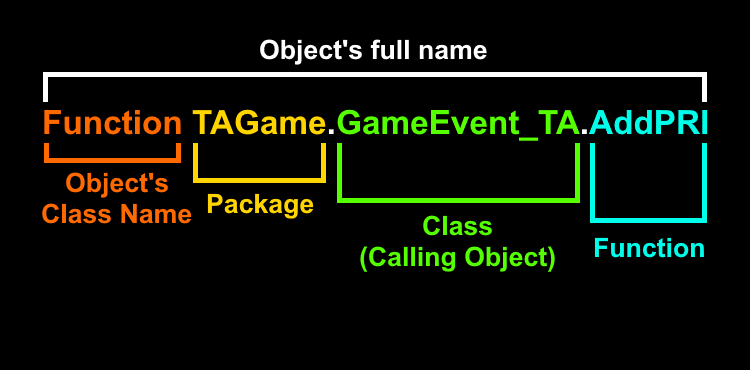Using Function Hooks
Function hooks are a powerful part of BakkesMod. After a function is hooked, any time it is called by Rocket League, your code is called as well. Many useful ones are documented in Commonly Hooked Functions. If you want to better understand them or hook a function that’s undocumented, hopefully this page will help.
There are multiple types of hooks. First are the two simpler ones. gameWrapper is a GameWrapper and will be accessible from any point in your code.
1
2
3
4
5
6
7
8
9
10
|
gameWrapper->HookEvent("Function TAGame.Car_TA.SetVehicleInput",
[this](std::string eventName) {
// Your Code here
// Call another function or just do your things here
});
gameWrapper->HookEventPost("Function TAGame.Car_TA.SetVehicleInput",
[this](std::string eventName) {
// Your Code here
});
|
HookEvent runs your code as the function is called
HookEventPost runs your code as the function is returned from
They return a std::string which is the name of the calling function. This is useful to differentiate what your caller is if you have multiple hooks calling the same code.
1
2
3
4
5
6
7
8
9
|
gameWrapper->HookEventWithCaller<CarWrapper>("Function TAGame.Car_TA.SetVehicleInput",
[this](CarWrapper caller, void* params, std::string eventname) {
// Your Code here
});
gameWrapper->HookEventWithCallerPost<CarWrapper>("Function TAGame.Car_TA.SetVehicleInput",
[this](CarWrapper caller, void* params, std::string eventname) {
// Your Code here
});
|
The two WithCaller variants do the same thing, but let you know a bit more about what is using the function
They provide a caller value which is obtained from the function’s name. After Function TAGame there will be a class name ending in _TA. If the name matches a wrapper name, you can hook it as that wrapper. Car_TA becomes CarWrapper for example. The image below breaks up a function call into parts. The class is GameEvent_TA, which can be cast to a ServerWrapper.

The hook also provides a void * pointer. This points at the location of any parameters provided to the function. These aren’t well documented, and are hard to guess, so feel free to ask about them if you think you need them. A couple useful functions and parameters can be found in Commonly Hooked Functions
For example Function TAGame.Car_TA.OnHitBall has a BallWrapper parameter. To access it, cast the void * pointer to a struct including the parameters
1
2
3
4
5
6
7
8
9
10
11
12
13
|
struct CarHitBallParams {
// This is a pointer to the ball's address
// but needs to be constructed into a BallWrapper before use
uintptr_t ball;
};
gameWrapper->HookEventWithCallerPost<CarWrapper>("Function TAGame.Car_TA.OnHitBall",
[this](CarWrapper caller, void* params, std::string eventname) {
// This cast is only safe if you're 100% sure the params are correct
CarHitBallParams* params = (CarHitBallParams*) params;
BallWrapper ballHit = BallWrapper(params->ball);
// Now you know what ball was hit!
});
|
Find functions with the function scanner
Note that hooking the same function multiple times does not work properly.
Only the first callback will be executed. The others are silently ignored.
1
2
3
4
5
6
7
8
|
/* Called */ gameWrapper->HookEvent(eventName, [this](...) { LOG("Initial HookEvent"); });
/* Ignored */ gameWrapper->HookEvent(eventName, [this](...) { LOG("Another HookEvent"); });
/* Called */ gameWrapper->HookEventPost(eventName, [this](...) { LOG("Initial HookEventPost"); });
/* Ignored */ gameWrapper->HookEventPost(eventName, [this](...) { LOG("Another HookEventPost"); });
/* Ignored */ gameWrapper->HookEventWithCaller<ActorWrapper>(eventName, [this](...) { LOG("Initial HookEventWithCaller"); });
/* Ignored */ gameWrapper->HookEventWithCaller<ActorWrapper>(eventName, [this](...) { LOG("Another HookEventWithCaller"); });
/* Ignored */ gameWrapper->HookEventWithCallerPost<ActorWrapper>(eventName, [this](...) { LOG("Initial HookEventWithCallerPost"); });
/* Ignored */ gameWrapper->HookEventWithCallerPost<ActorWrapper>(eventName, [this](...) { LOG("Another HookEventWithCallerPost"); });
|
Written by ubelhj

